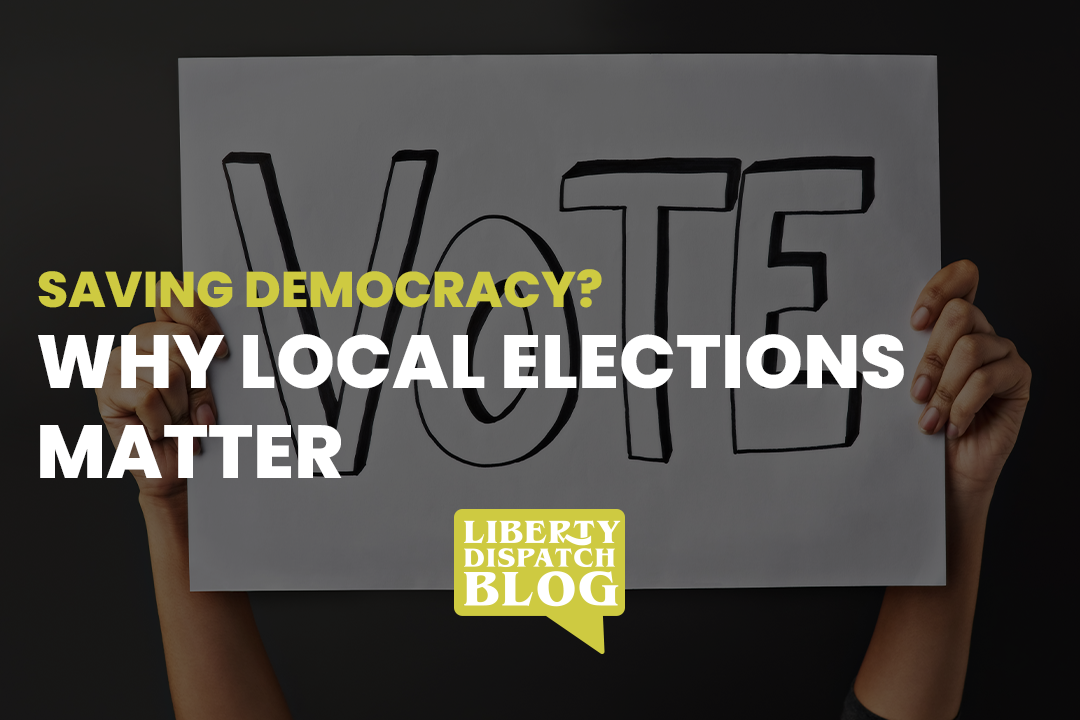
Saving Democracy? Why Local Elections Matter
State and local elections play a vital role in shaping our daily lives, yet they often receive less attention than national races.
If we have seen anything the last four years it has been in the vital influence judges have on a community. In 2023, Wisconsin achieved a liberal majority on its state supreme court bench, which was the first time in 15 years. At that point, the state had a list of high-profile cases including abortion and voter identification. The liberal judges did not waste any time executing their agendas and influencing laws. It was so bad that republicans tried to impeach the final judge who gave the democrats the majority two weeks after being appointed in order to try to stop the radical left agenda.
Things roll downstream and local counties and cities saw an increase of liberal judges as the agenda of the democrats continued to shift and change life as conservative Wisconsin citizens tried to figure out what was happening.
The reality is that they, like other states who have dealt with similar issues, learned the hard way how much state and local elections matter. Our votes weigh more in the local ballots than they do with the national races simply because of the total number of voters.
Local governance impacts education, where school board decisions directly influence curriculum choices, funding allocations, and student policies including LGBTQ+ propaganda. These choices determine whether schools implement new STEM programs, adjust start times, or invest in arts education. School bonds appearing on local ballots can make the difference between modern facilities and deteriorating buildings.
Public safety, another crucial aspect of local governance, falls under the oversight of city councils and county commissioners. These officials determine police department policies, funding levels, and emergency response protocols. The election of a sheriff, for instance, can dramatically shift law enforcement priorities or reshape community policing approaches or the lack thereof. Similarly, local courts handle most criminal cases and traffic violations, making judicial elections particularly significant for community safety and justice.
Housing and development decisions made at the local level have long-lasting effects on community character and affordability. The last four years have shown us that the illegal alien crisis can completely tank a neighborhood. Zoning boards influence housing accessibility through density regulations, while city councils approve or reject new developments. A single city council vote could determine whether affordable housing gets built or if historic buildings are preserved. These decisions directly impact property values and neighborhood dynamics, affecting residents' financial well-being and quality of life.
The economic impact of local elections extends beyond housing. City tax rates affect both residents and businesses, while local governments offer business incentives and development grants that can attract or deter new employers. Business licensing and regulation happen primarily at the local level, shaping the commercial character of communities. Quality of life issues also fall under local control, including parks and recreation funding, library services, and public transportation.
Environmental initiatives often begin at the local level, with city councils deciding on recycling programs, water quality standards, and green space preservation. Local voters might face decisions about sustainability initiatives like plastic bag bans or tree preservation ordinances. These choices have immediate environmental impacts and set precedents for broader environmental policy.
Local governance also offers unique opportunities for direct democracy through ballot initiatives and referendums. Citizens can propose and vote on local laws, directly shaping their communities. The accessibility of local officials sets these elections apart – representatives typically live in the community and attend regular public meetings where citizens can voice concerns directly. This proximity allows for more responsive and accountable governance.
Budget priorities at the local level determine how tax revenues are spent; forcing choices between competing needs like infrastructure and social services. These decisions might determine whether to fix roads, expand senior services, or open/close abortion clinics. Long-term planning decisions made by local officials shape community development for decades, including infrastructure planning, climate resilience strategies, and economic development initiatives.
Emergency response capabilities, cultural programs, and social services all depend on local election outcomes. Officials' decisions during emergencies can have immediate life-or-death consequences, while their support for arts programs, social services, and community events shapes the cultural fabric of the community. The cumulative effect of these local decisions often has a greater impact on daily life than national policies. For instance, your local property tax rate might affect your monthly budget more than federal tax changes, or your child's education might be more influenced by school board decisions than by federal education policy.
Where things get even trickier is when you consider the hot button topics of open borders, amnesty, abortion on demand, censorship, socialist policy, LBGTQ initiatives. The reality is that if there is political party alignment instead of diversification then these items get easily passed and your local life dramatically changes.
If you go online, you can find the voter guide by party for your county so that you can be an impactful voter. Do not show up uninformed thinking you can wing it.
In the end, understanding the significance of local elections helps all of us make informed decisions that directly affect our communities' future. These elections determine everything from commute times to educational quality to property values to hot button social issues, making them equally important to, if not more important than, high-profile national races. The officials elected at the local level make decisions that shape the immediate environment in which we live, work, and raise our families.
Therefore know who to vote for at ALL levels and be clear when you get to the voting booth. The future depends on it.


